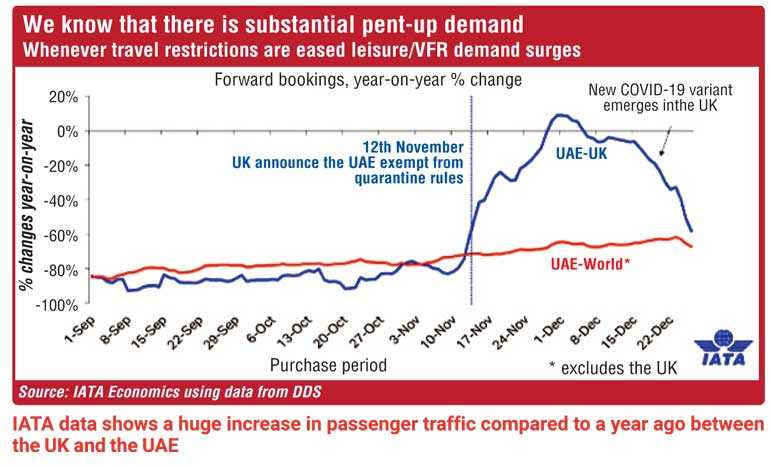Saturday Feb 21, 2026
Saturday Feb 21, 2026
Tuesday, 2 March 2021 01:00 - - {{hitsCtrl.values.hits}}

 The Arabian Gulf, known for its torrid summer heat, is at its best during the short winter. December is particularly lovely, with warm daytime temperatures, cool nights, light winds and calm seas. Perfect vacation weather compared to northern Europe, which is dank and gloomy by then. What better time to start reopening Dubai for mass tourism after months of COVID-induced lockdowns than the Christmas holidays?
The Arabian Gulf, known for its torrid summer heat, is at its best during the short winter. December is particularly lovely, with warm daytime temperatures, cool nights, light winds and calm seas. Perfect vacation weather compared to northern Europe, which is dank and gloomy by then. What better time to start reopening Dubai for mass tourism after months of COVID-induced lockdowns than the Christmas holidays?
The United Arab Emirates is technically one nation, but in some areas the seven individual, constituent states have sufficient autonomy to behave differently. Abu Dhabi, home to Etihad Airways and the richest of the UAE sheikhdoms, kept COVID restrictions in place. Neighbouring Dubai with its huge leisure sector (estimated at 12% of GDP) and home-base of Emirates (airline), decided to throw open its doors for winter tourism in December 2020.
The UAE was included in Britain’s ‘safe travel corridor’ list of countries. This meant that travellers from the UAE did not need to self-isolate on return to the UK. Coupled with the recent normalisation of diplomatic ties between the UAE and Israel, a surge in tourism was seen in December 2020.
A welcome relief for the leisure industry
The industry surmised that there was substantial pent-up demand for leisure travel, suppressed due to pandemic restrictions. The chart based on International Air Transport Association (IATA) data, shows a huge increase in passenger traffic, compared to a year ago, between the UK and the UAE. Emirates resumed Airbus A380 flights to London in early December, and by Christmas four of the giant airplanes were flying daily between the two countries.
Arrivals in Dubai from Israel were even greater. The Abraham Accords, normalising relations between the two nations for the first time in their respective histories, were signed in September 2020. Subsequently, when scheduled flights began linking both countries, it is estimated that 5,000 visitors from Israel entered the UAE in November. This number surged tenfold to in excess of 50,000 by December. Hotel menus in Dubai are now required to include kosher selections (food prepared according to Jewish dietary rules), and signs in Hebrew are seen all over the city.
The virus strikes back
However, as seen by the subsequent sharp drop in bookings, the pandemic had the last word. As new variants of COVID-19 emerged, particularly one strain originating in the UK, infections in Dubai began to soar again within a few weeks. Responding to the large increase in transmission, the UK reimposed quarantine for arriving travellers from Dubai by mid-January.
Dubai saw a tripling of its daily COVID cases from late December. Restrictions were reimposed, including full lockdowns, and are not due to be eased for months. The UAE government has implemented a nationwide vaccine rollout in order to bring the virus under control again.
A grand experiment in vaccinating the entire country
Both the UAE and Israel have set about attempting to vaccinate their entire countries in an effort to achieve ‘herd immunity’. This is defined as ‘immunity from, or resistance to, a specific infectious disease throughout a population that results from a majority of that population having been exposed to that infection, such as by having been vaccinated for it or having been previously infected by it’.
The UAE has a population of approximately 10 million, and Israel 8.6 million. Both countries are attempting to vaccinate as many residents as possible, with around 75-85% accepted as being sufficient, so as to achieve herd immunity without delay.
The Israeli approach is to use one type of vaccine, the Pfizer/BioNTech product. This effectively means that the whole country has become a gigantic clinical trial and test bed for the effectiveness of this vaccine. Already 4.6 million people (50.4% of the population) have received a first dose, with 50,000 vaccinations a day being conducted.
The UAE conducted early clinical trials of the Chinese made Sinopharm vaccine, and was the first country to certify it. This has been the primary one used, with more than 5.6 million residents receiving their initial dose. The Pfizer vaccine, only available in limited quantities, is being reserved for frontline healthcare workers and those with pre-existing medical conditions.
Herd immunity to reopen the borders
Both countries plan on immunising everyone who is willing to receive the vaccine by the end of March 2021, becoming the first two nations in the world to do so. The progress of the disease after this milestone is achieved will be of paramount interest to the travel and leisure industry. The UAE’s ‘mega’ airlines, which have grounded large numbers of aircraft and made many staff redundant, will be keen to resume passenger flights as soon as possible.
Some sort of vaccination certificate, or ‘immunity passport’, for those who have recovered from the disease, may be a requirement for international travel. However, the World Health Organization (WHO) has advised against such a move because of “…uncertainty about whether long-term immunity truly exists…for COVID-19”. Whether travellers who have been immunised can still be a vector for transmission, is another of this pandemic’s many unknowns.
Therefore, while the need to achieve herd immunity will be a pressing need for all countries that rely on inbound tourism, many unanswered questions remain. Opening borders before protecting one’s population can be a hazardous step, as Dubai found to its cost over the winter travel season.